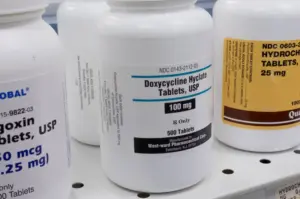When it comes to hair loss treatments, Rogaine is a name that frequently comes up. But with its popularity, questions about its side effects also arise. One common concern is whether Rogaine causes weight gain. This article aims to delve into this query and provide a clear understanding of Rogaine’s effects on weight.
Rogaine, also known by its generic name minoxidil, is a topical medication commonly used to treat hair loss. It is applied directly to the scalp and is available in both liquid and foam formulations. Rogaine works by stimulating hair follicles, promoting hair regrowth, and slowing down hair loss.
Minoxidil’s journey from a blood pressure medication to a hair regrowth treatment is fascinating. Initially, it was developed to manage hypertension, but during clinical trials, participants noticed an unexpected side effect—hair growth. This led researchers to explore its potential as a topical treatment for hair loss.
Originally developed as a treatment for high blood pressure, minoxidil was found to have the unexpected side effect of hair regrowth. When applied to the scalp, it widens blood vessels, allowing more oxygen, blood, and nutrients to reach hair follicles, thereby promoting hair growth.
Rogaine is designed for easy application, making it accessible for daily use. The foam or liquid is applied directly to the scalp, focusing on areas where hair thinning is noticeable. Consistent application is key to seeing results, and users are advised to follow the instructions carefully to maximize effectiveness.
Rogaine is available in different strengths and formulations to cater to varying needs. While the 5% solution is commonly recommended for men, women often use a 2% solution. Each formulation is designed to cater to the specific needs of different users, balancing effectiveness with potential side effects.
Like any medication, Rogaine has its share of side effects. Common side effects include itching, redness, or irritation at the application site. Some users may also experience unwanted facial hair growth.
The most frequent side effects of Rogaine are dermatological in nature. Users might experience minor irritation, such as itching or redness, particularly when first starting the treatment. These symptoms often subside as the scalp becomes accustomed to the medication.
In some cases, users might notice hair growth in unintended areas, such as the face or forehead. This is usually due to accidental application or transfer of the product from the scalp. Ensuring precise application can help mitigate this side effect.
While less common, some users report experiencing dizziness or a mild headache after application. These symptoms are typically short-lived but should be monitored. If they persist, consulting a healthcare professional is advisable.
The concern about Rogaine causing weight gain seems to stem from its history as an oral medication. When minoxidil was first used orally to treat high blood pressure, weight gain was noted as a possible side effect. This was largely due to fluid retention and changes in body metabolism.
It is crucial to distinguish between oral and topical applications. The topical form of Rogaine is applied externally and is less likely to affect the body in the same way as its oral counterpart. The systemic absorption from the scalp is minimal, reducing the risk of widespread side effects.
Weight gain associated with oral minoxidil was primarily due to fluid retention. This side effect was a result of the medication’s impact on the kidneys and cardiovascular system. The topical application does not have the same systemic reach, significantly lowering the risk of such side effects.
Oral minoxidil can alter body metabolism, contributing to weight changes. In contrast, topical minoxidil is designed to target hair follicles specifically, minimizing any systemic metabolic effects. This localized action significantly reduces the likelihood of weight gain.
Currently, there is no substantial evidence linking the topical use of Rogaine to weight gain. Clinical studies and user reports primarily focus on localized side effects such as scalp irritation. There is a significant lack of data supporting the idea that topical Rogaine causes systemic side effects like weight gain.
Clinical trials on Rogaine have consistently shown its efficacy in promoting hair growth without significant systemic side effects. Most studies highlight its benefits in hair regrowth and emphasize that the side effects are primarily localized and mild.
Feedback from Rogaine users predominantly focuses on its effectiveness in combating hair loss. While some users report minor side effects, there is a notable absence of complaints regarding weight gain. This user data supports clinical findings that systemic side effects are rare.
The absence of credible research linking topical Rogaine to weight gain is telling. Most concerns are speculative and not supported by scientific data. This reinforces the understanding that weight gain is unlikely with proper use of the topical treatment.
If you are concerned about weight gain while using Rogaine, it’s essential to consider other factors that might contribute to weight changes. Lifestyle, diet, and other medications are common culprits of weight gain.
Weight gain can often be attributed to changes in lifestyle or diet rather than medication. Factors such as decreased physical activity, increased caloric intake, or stress can contribute significantly to weight changes. Evaluating these aspects can provide clarity.
Sometimes, weight changes are linked to other medications being taken concurrently. Certain medications, especially those affecting hormonal balance or metabolism, can influence body weight. Reviewing your medication list with a healthcare provider can help identify potential causes.
If weight gain remains a concern, consulting with a healthcare professional is advisable. They can conduct a thorough evaluation to determine the cause and suggest appropriate actions. Professional guidance ensures that all factors are considered in managing weight.
For those concerned about the potential side effects of Rogaine, including weight gain, there are alternative hair loss treatments to consider:
Finasteride (Propecia): An oral medication that reduces the production of a hormone linked to hair loss. It is a popular choice for men and has been shown to be effective in slowing hair loss and promoting regrowth.
Hair Transplants: A surgical option involving the transplantation of hair follicles from one part of the body to the scalp. This method offers a permanent solution to hair loss, albeit at a higher cost and with a longer recovery period.
Natural Remedies: Some people explore options like essential oils, scalp massages, and a balanced diet to support hair health. These methods can complement medical treatments and offer a holistic approach to managing hair loss.
In conclusion, the idea that Rogaine causes weight gain is largely unfounded, especially when considering its topical application. While oral minoxidil has been linked to weight gain due to fluid retention, the topical version does not share this side effect profile. However, it’s always wise to stay informed and consult with healthcare providers regarding any concerns about side effects or health changes.
It’s essential to monitor your body and make informed decisions about your health. Keeping track of any changes while using Rogaine ensures that you can address concerns promptly. Regular consultations with healthcare professionals can provide reassurance and guidance.
By understanding the nature of Rogaine and its actual side effects, you can make better decisions about your hair loss treatment options without unnecessary worry about weight gain. Knowledge empowers you to choose treatments that align with your health goals and lifestyle.
Remember, each individual’s response to medication can vary. What works for one person may not work for another. Personalizing your approach to hair loss treatment ensures that you achieve the best possible outcomes.


